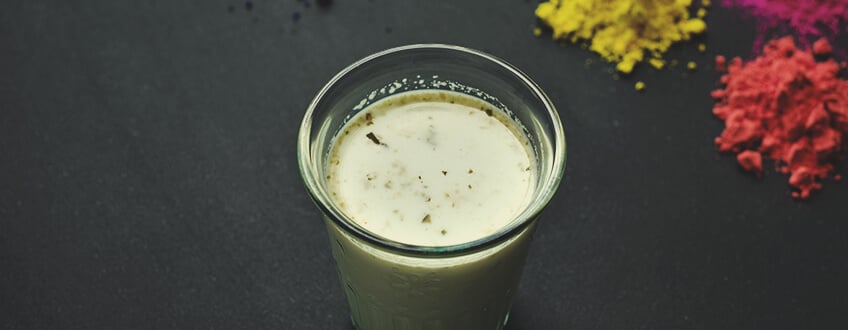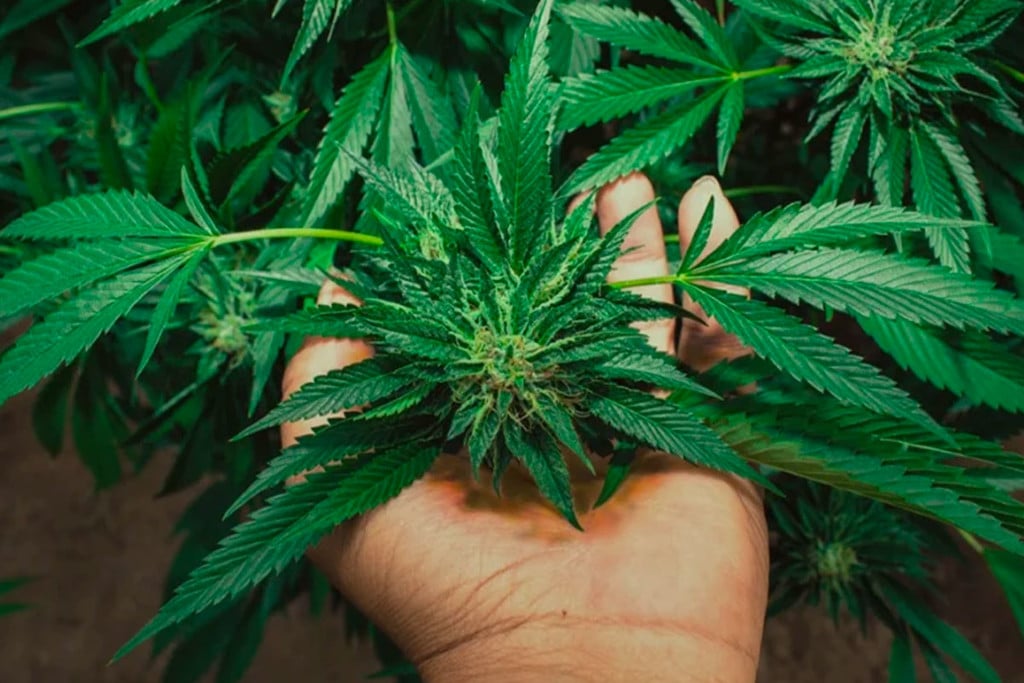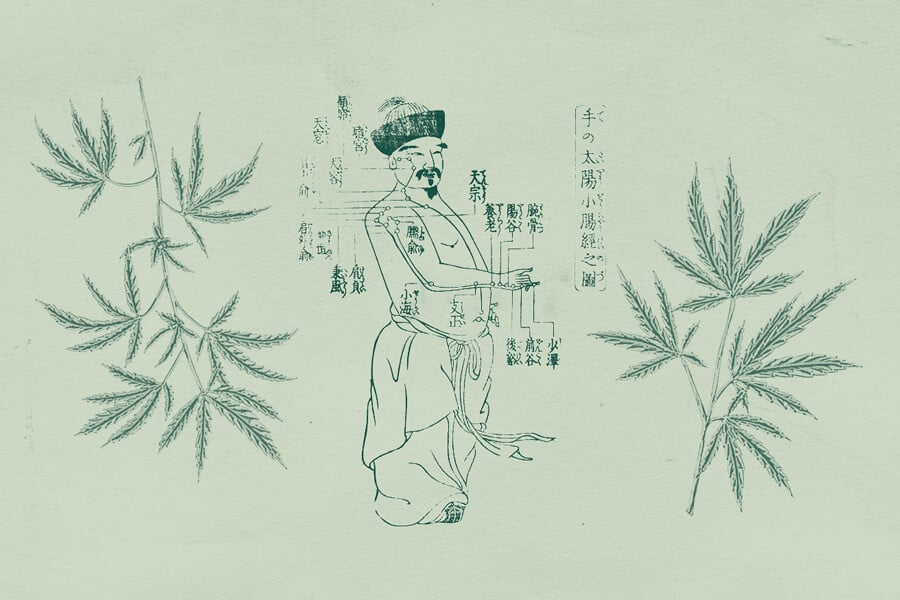.

Cannabis and Spirituality: The Use of Weed in World Religions
It's no secret that cannabis offers moments of spiritual insight. Therefore, it comes as no surprise that many world religions used, and still use, the plant in one way or another. Hindus drink cannabis-infused bhang on holy days, Scythians used to hotbox tents as a funeral rite, and Sufi Muslims even used cannabis to brighten their spirits.
The mind-altering nature of cannabis changes the way we look at things. It nurtures our creative faculties, allows us to consider things from a different angle, and inspires big existential questions. It’s no wonder then that religions throughout the ages have used cannabis to facilitate a closer connection to the divine.
When you stop and think about it, the true nature of reality rattles the mind. There are no solid answers as to why we exist. We find ourselves cruising through an infinite universe on a lump of rock. Against all odds, our cosmic vehicle developed a thin slice of atmosphere that enabled life to develop and branch out into millions of species of fungi, plants, and animals.
Then humans appeared. We’re strange creatures indeed. Somehow, along the way, a bipedal apelike animal emerged with self-awareness. Not only did this trait help us to develop language and the ability to self-reflect, but it resulted in abstract thoughts of other realms, higher beings, and intelligent design.
Contents:
- The development of religion
- Weed in ancient chinese spirituality
- Taoism and cannabis
- Shintoism: early cannabis spirituality in japan
- Buddhism and marijuana
- Ancient egypt: evidence of weed and spirituality?
- Hinduism and ancient oral cannabis
- Judaism and marijuana
- Christianity and cannabis
- Cannabis spirituality in islam
- The scythian cult of the dead and the ceremonial use of cannabis
- Cannabis in germanic paganism
- Rastafari: cannabis as a sacrament
- Cantheism: a religion based on marijuana and spirituality
The Development of Religion
Thousands of years ago, our ancestors were more tuned in to the mystical nature of reality. Without modern distractions, much of their lives were governed by natural phenomenon, the will of the gods, and spiritual superstitions. Humans all over the world developed religions as a framework to make sense of the mysterious world around them.
Some academics suggest religion stems from evolutionary processes. Scholastic renegades propose more controversial origins. Terence McKenna points to his stoned ape theory—the idea that the ingestion of psilocybin mushrooms gave rise to abstract thoughts of gods and spiritual realms.
Other researchers, including evolutionary psychologist Robin Dunbar, pin the origins of religion on a sociological adaptation. Dunbar claims that religion occurred as a “group-level adaptation” that worked as a “kind of glue that holds society together”.
Regardless of how religion originated, cannabis clearly played an important role in many belief systems in the ancient world. But the spiritual use of cannabis also occurs today. Discover how different religions throughout history have harnessed cannabis in their rituals, rites, and offerings.
Weed in Ancient Chinese Spirituality
Ancient China served as the birthplace of the historical use of cannabis. Before the rise of more structured religions, the people in this region held shamanistic and animistic worldviews. Evidence of this can be traced to religious practices of the Yangshao Culture in the Yellow River Valley. Here, ancient tombs dating back to 4,500–3,750 BCE contain grave goods[1] that suggest a belief in the afterlife.
The belief systems of ancient China featured traits of animism—the worship of personifications of nature. Eventually, this archaic system developed more structure and a pantheon consisting of over 200 gods. People of that time also held a strong belief in the supernatural, including an emphasis on ghosts, ancestor worship, dragon spirits, and divination.
Shamanic practitioners also existed in ancient China. Known as “wu”, these mystical figures are depicted as having control over the weather and being able to communicate with spirits, and spent much of their time collecting magical herbs to treat illnesses.
The specific use of cannabis in this world of spirits, gods, and magic remains unclear. However, evidence suggests that weed and spirituality had some kind of association. Archaeologists unearthed cannabis leaves, shoots, and flowers from 2,500-year-old Yanghai Tombs located in the northwest of modern-day China. Amazingly, the cellular structure and trichomes[2] of these samples remained intact over the millennia.
The presence of cannabis in tombs suggests a spiritual use of the plant, raising the possibility of the herb’s use within the shamanic and animist systems of ancient China. Although, non-preserved samples would have perished thousands of years ago, making it impossible to determine exactly how and where these ancient people used cannabis spiritually.

Taoism and Cannabis
The key principle of Taoism: Go with the flow. The Taoist ideology sees the universe as one big entangled conscious force[3]. The “Tao” itself is the source, substance, and fundamental energy that runs through and animates all things. Based on this outlook alone, it seems as though a lot of weed was smoked to reach this cosmic conclusion.
The emergence of Taoism dates back to at least the 4th century BCE in China. Historians credit the ancient Chinese philosopher and writer Lao Tzu (who may or may not have actually existed) as the founder of the religion. Those that live by the way of the Tao seek to live with naturalness, simplicity, and spontaneity. Followers also value the Three Treasures: compassion, frugality, and humility.
Taoists also practice alchemy, intending to achieve immortality. They take part in rituals, exercises, and ecstatic spiritual journeys that they believe align them with cosmic forces and extend their biological life.
Because ancient China serves as the birthplace of historical cannabis use, and Taoist practices appear so abstract and trippy, it makes logical sense that cannabis played a part in the religion. Well, it turns out that the Taoists didn’t exactly shy away from the herb.
Certain sects even personified cannabis as a deity. During the Tang dynasty, the cult of Magu (Miss Hemp) associated this Toaist xian (immortal) with the elixir of life. According to Taoist legend, Magu occupied the sacred Mount Tai, where followers gathered cannabis on the seventh day of the seventh month, in synchrony with Taoist banquets.
Taoist texts also display the importance of cannabis within this worldview. The Taoist encyclopedia Wushang Biyao (translated as “Supreme Secret Essentials''), penned in 570 AD, documents the use of cannabis in incense burners during rituals, as well as the Taoist tendency to experiment with mind-altering smokes.
Shintoism: Early Cannabis Spirituality in Japan
Japan has a long history with the hemp plant. Indigenous peoples on the island used it to make clothes and baskets, and they consumed the seeds. It therefore comes as no surprise that the ancient religion of Shintoism held cannabis in high regard.
As the indigenous religion of Japan, Shintoism, or “the way of the gods”, is as old as the nation itself. As a somewhat decentralised belief system, Shintoism differs dramatically from other faiths. No single person founded the religion, and services and preaching are uncommon. Instead, Shintoism emerged organically from the culture and people of Japan. Followers of Shinto believe in sacred spirits called kami, which take on forms of natural elements, organisms, and structures such as mountains, the wind, and trees.
Shinto lacks a strict objective morality, with no tight doctrine on right or wrong, but accepts that the perfect person does not exist. The religion harbours a superstitious and spiritual view of the world. While humans are perceived as fundamentally good, they can fall prey to the doings of evil spirits.
But what can a mortal human do against such an adversary? Grab some weed, of course! Cannabis holds spiritual significance in Shintoism. Followers see the herb as a cleansing plant capable of casting away evil spirits. Shinto priests wave bundles of weed[4] over possessed individuals to exorcise these pesky malevolent beings.

Buddhism and Marijuana
Buddhists have varying views when it comes to cannabis. Some sects are more open to cannabis use, whereas others strictly oppose it. Regardless of these contrasting opinions, the herb did play a role in the Buddha’s journey—Gautama Buddha consumed a diet of one hemp seed per day over a period of six years on his path to enlightenment.
The Buddhist religion originated in ancient India between the 6th and 4th century BCE. The teachings of Gautama Buddha developed over time into a large body of traditions and spiritual practices. Some of the key beliefs of Buddhism include karma, rebirth, liberation from the cycle of rebirth, and the attainment of nirvana (the transcendence of suffering).
Buddhists also follow a set of beliefs known as the Five Precepts. The Fifth Precept specifically prohibits intoxication through alcohol and drugs. It seems like this rule should completely remove cannabis from the equation. However, the pages of the Mahakala Tantra (an eight-chapter scripture) talk about the prescription of cannabis and other mind-altering substances for medicinal purposes.
The three main branches of Buddhism view cannabis from different perspectives.
Theravada Buddhism
As the oldest existing Buddhist school, Theravada (School of the Elders) maintains a conservative view of cannabis and takes the Fifth Precept much more seriously, which results in a stronger anti-drug stance than other branches.
Mahayana Buddhism
Mahayana[5] (Great Vehicle) accepts the main Buddhist scriptures and early teachings, but the school has added their own doctrines and texts to their branch. Mahayana sports more of an emphasis on the bodhisattva path (the way to Buddhahood) and has a slightly more relaxed approach toward cannabis. Their ethical code teaches that anything beneficial for a person should be accepted—hinting at a tolerance toward medical marijuana at the very least.
Vajrayana Buddhism
The Vajrayana school (Way of the Diamond) claims that it offers a faster path to enlightenment and highly regards the concept of karma. This school takes the most lenient view toward cannabis and other taboos. It encourages followers to see the essence of purity in all things, including sex and drugs such as marijuana.
Ancient Egypt: Evidence of Weed and Spirituality?
Ancient Egyptian spirituality revolved around a pantheon of gods that controlled both nature and human society. Followers deified forces and life forms in the world around them, including elements and the characteristics of some animals. Many of the spiritual practices aimed to gain favour with the gods for human benefit, while others centred around the pharaohs, who were believed to possess divine powers.
The ancient Egyptians used cannabis for industrial and therapeutic purposes, but the exact ceremonial and religious use of the herb remains obscured. However, archaeologists have found evidence of cannabis use while studying the mummified pharaohs. Because of their divine status, these findings suggest the use of the herb in a religious context. Researchers also found a significant level of THC, alongside cocaine and nicotine, while studying a mummy dating back to 950 BCE. Cannabis pollen was also found on the mummy of Ramesses II[6], who died in 1213 BCE.

Hinduism and Ancient Oral Cannabis
Weed and spirituality go hand in hand when it comes to Hinduism. As one of the oldest religions in the world, the faith dates back over 4,000 years. Key beliefs within the Hindu system include reincarnation, karma, the belief in the soul (atman), and salvation that ends the cycle of rebirth (moksha).
Hindus embrace cannabis as a sacrament, an offering, and a substance formed from the blood of Shiva—a member of the religion’s trinity. The sacred texts of the religion, known as the Vedas, even speak of the sanctity of marijuana. The pages describe five sacred plants. Cannabis serves as a member among these ranks, and some Hindus believe a guardian angel occupies the leaves. The Vedas also describe cannabis as a “liberator” and a “source of happiness”.
Bhang also plays an important role in Hindu festivals. This psychoactive beverage, crafted from cannabis, milk, and flavourful herbs, provides an altered state of consciousness during Shivratri (the night of Shiva) and Holi (the festival of colours).
Judaism and Marijuana
The monotheistic religion of Judaism shares a lot in common with Christianity. Although Jews deny Jesus as the messiah (one major belief that divides them from Christians), they also state the importance of forgiveness, prayer, fasting, and obeying God’s laws.
The use of cannabis in ancient Judaism remains a debated topic. In 2020, Israeli archaeologists found traces of the herb on artefacts from an eighth-century BCE shrine at Tel Arad. Some scholars also argue that the term “kaneh bosem”, a plant used in the holy anointing oil in the Book of Exodus, refers to cannabis. However, other academics refute this translation and propose it refers to other plant species.
Regardless of the ancient use of cannabis in Judaism, rabbis in the modern era have a mixed stance on the topic of weed. In 1978, Orthodox rabbi Moshe Feinstein reminded followers of the prohibited status of cannabis under Jewish law, and how the herb prevents the faithful from praying and studying the Torah. Other modern rabbis hold a contrasting view. Some are totally on board with medicinal cannabis and even state that the herb holds a kosher status during Passover.

Christianity and Cannabis
Much like Judaism, Christians hold differing views when it comes to weed. More conservative denominations, including Orthodox, Catholic, and some Protestant churches, denounce the use of cannabis. However, other Protestant branches support the use of medical marijuana, including the Presbyterian Church, the United Church of Christ, and the Episcopal Church.
Some scholars also claim that the Bible indirectly mentions cannabis: “Behold, I have given you every plant yielding seed that is on the face of the earth, and every tree with seed in its fruit. You shall have them for food”. Others counter this supposed justification for using cannabis with passages such as Peter 5:8: "Be sober-minded; be watchful. Your adversary the devil prowls around like a roaring lion, seeking someone to devour”.
Some academics that study scriptures have taken the pro-cannabis argument one step further. Based on the kaneh bosem claim, they make the argument that Jesus and his disciples used cannabis as an ingredient in their healing ointment.
Cannabis Spirituality in Islam
Although Islam advocates what are perceived as conservative practices, cannabis falls into a grey area. The Quran, the central text of the religion, uses the term “haram” to prohibit certain behaviours, including the consumption of alcohol. Although the Muslim prophet Muhammad recognised alcohol to have some medicinal application, he claimed its potential for sin far outweighed any benefits.
So, why didn’t Muhammad outlaw the use of marijuana? It turns out he probably didn’t know it existed. Although people living in India and Iran used cannabis as an intoxicant as far back as 1,000 BCE, those in the Middle East didn’t dabble in hashish until 1,800 years later[7], two centuries after the death of Muhammad.
However, Muhammad stated in one of his hadiths (sayings): “If much intoxicates, then even a little is haram”. It could very well be the case that if he was aware of cannabis, he would have labelled it haram alongside booze.
Cannabis played a spiritual role in the mystical branch of Islam. Known as Sufism, followers of this practice live an ascetic lifestyle. They renounce worldly things and seek to purify the soul through fasting and prayer.
The Persian Sufi saint Qutb ad-Dīn Hayder developed a fondness for cannabis and catalysed an explosion in its popularity across the Islamic world. The story goes that Haydar stumbled upon cannabis while strolling through the countryside and discovered the divine and joyful nature of the plant[8]. After what sounded like a great time, Haydar returned to his disciples and told them, “Almighty God has bestowed upon you by a special favour the virtues of this plant, which will dissipate the shadows that cloud your souls and will brighten your spirits”.
Scholars state that Haydar wanted to keep the divine effects of cannabis an esoteric secret. However, word soon got out. Things unfolded to such a degree that the spiritual use of marijuana spread out to Syria, Egypt, and Iraq, where it became known as “Haydar’s Lady”.

The Scythian Cult of the Dead and the Ceremonial Use of Cannabis
The Scythians. Oh, the Scythians. Anybody with a soft spot for history will enjoy nerding out on this Dothraki-esque civilisation. This nomadic culture of Aryan horse-riding warriors lived on the Pontic steppe, a region that extends from the northern shore of the Black Sea to western Kazakhstan.
When the Scythian tribes weren’t inventing new killer bows or conquering rival civilisations, they set up hotboxes and got blazed. But their use of cannabis has a sombre tone. They used the herb during funeral ceremonies. Following burials, Scythians would purify themselves by sitting in tents and filling them with cannabis smoke.
The ancient Greek writer Herodotus penned an account of this ritual: “...the Scythians have taken some seed of this hemp, they creep under the cloths and put the seeds on red-hot stones”. He also spoke of the apparent effects of this practice: “The Scythians, transported by this smoke, shout aloud”.
Cannabis in Germanic Paganism
Germanic paganism refers to the religion practised by Germanic people from the period of the Iron Age up until the Middle Ages. Rich in mythology and folklore, Germanic peoples worshipped an extensive pantheon of gods[9], including Odin, Thor, Balder, Loki, and Freyja. Appeasing these gods often involved dark activities, including human sacrifice in several different forms.
Not much evidence links the use of cannabis to spiritual practices within this belief system. However, practitioners may have associated cannabis with Freyja, the Norse goddess of love and fertility.
Rastafari: Cannabis as a Sacrament
We can’t write an article about cannabis and religion without mentioning Rastafari. Also known as Rastafarianism, this cannabis-loving belief system has a lot in common with both Judaism and Christianity. Practitioners of the faith regard the Bible as their holy book. They are monotheists that worship Jah, short for Jehovah, the name of God in the Bible. But Rastafari ideology also differs from Christianity in that believers view Haile Selassie, the Emperor of Ethiopia between 1930 and 1974, as the second coming of Christ.
Rastas live by several key practices. Many devout followers abide by an ital way of eating, which focuses on locally and organically grown food. Most Rastas follow the dietary laws set out in the Book of Leviticus and avoid pork and crustaceans, whereas others choose to consume either a vegetarian or vegan diet.
Cannabis also forms an important element of the spiritual practices of Rastafari. Rastas smoke cannabis in a ritualistic manner. They often use the herb during “groundings”. These gatherings cultivate relationships between like-minded followers. They usually involve the playing of drums, smoking of herb, and singing of hymns.
Rastas hold the view that the passages in the Bible that seem to hint at cannabis really do refer to the herb. They view the plant as a sacrament that helps to induce feelings of peace and love, introspection, and facilitates the discovery of inner divinity.

Cantheism: A Religion Based on Marijuana and Spirituality
Although cannabis played a peripheral role in religions of the past, modern spiritual systems have made weed the theological centrepiece. The emerging religion of Cantheism uses the herb as a sacrament to cultivate community and connection.
Founded by cannabis activist Chris Conrad in 1996, Cantheism lacks dogma, only has loose rituals and codes, and merges marijuana and spirituality. A Cantheist service looks like this: Participants meet on a Sunday afternoon, everyone brings some flower to share, and the altar features a live plant and some hemp twine.
To kickstart the ceremony, attendees sit in a circle and speak the creed. The leader of the ceremony declares: “I appreciate Cannabis Hemp as a sacrament I use to connect me with my community and with myself”, to which the participants reply: “Therefore, we share it in thanksgiving and deep respect for its resinous powers”.
- Religion in Ancient China - World History Encyclopedia https://www.worldhistory.org
- A new insight into Cannabis sativa (Cannabaceae) utilization from 2500-year-old Yanghai Tombs, Xinjiang, China - ScienceDirect https://www.sciencedirect.com
- Taoism | National Geographic Society https://www.nationalgeographic.org
- The Secret History of Cannabis in Japan https://apjjf.org
- Mahayana Buddhism - World History Encyclopedia https://www.worldhistory.org
- Drug History Timeline https://drugtimeline.ca
- HASHISH IN ISLAM https://europepmc.org
- HASHISH IN ISLAM https://europepmc.org
- Germanic religion and mythology - Beliefs, practices, and institutions | Britannica https://www.britannica.com






































